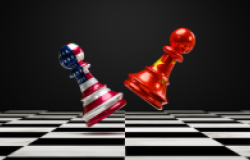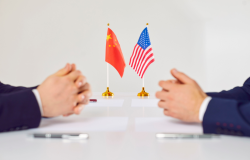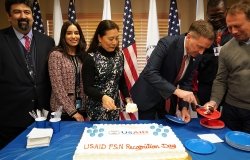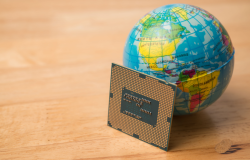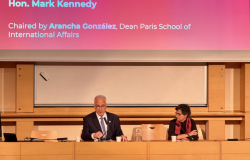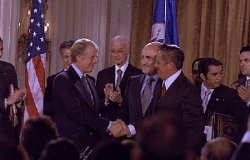Obama's Delicate Dance with Vietnam
KICUS Associate Sandy Pho contextualizes President Barack Obama's May 2016 Vietnam visit and discusses possible implications for U.S.-China-Vietnam relations.

This article was originally published at RealClearWorld.
When U.S. President Barack Obama travels to Vietnam this week, he will need to execute a delicate diplomatic dance.
On the one hand, Obama will need to signal Washington’s genuine desire to deepen relations with a nation that is important to U.S. interests and that figures significantly in the U.S. rebalance to Asia. At the same time, he will need to take care not to introduce new tensions in America’s complex yet essential relationship with China. He must make clear that the United States is not reaching out to Vietnam and its neighbors in order to contain Beijing.
U.S.-Vietnam relations are of growing importance in their own right -- even without adding China to the picture. In 2013 the United States and Vietnam upgraded their relationship to a comprehensive partnership. Although this is the lowest level of partnership Vietnam offers -- China enjoys the highest status of comprehensive strategic partner -- it opened the door for more direct cooperation between Washington and Hanoi. To commemorate the 20th anniversary of the normalization of U.S.-Vietnam relations, U.S. Defense Secretary Ashton Carter met with his Vietnamese counterpart, Defense Minister Phung Quang Thang, in Vietnam and signed a joint vision statement on defense relations in 2015.
Even with the vast improvements in bilateral defense ties since diplomatic normalization in 1995, mutual mistrust still pervades the relationship. The U.S. government maintains a partial ban on the sale of lethal weapons to Vietnam due to concern over human rights abuses. The Communist Party of Vietnam remains suspicious of U.S. intentions and of the American penchant for spreading democracy.
The enthusiasm with which Vietnam welcomes a stronger U.S. presence may be viewed as “provocative” in China, and could result in unintended consequences for Vietnam if President Obama mishandles his messaging in Hanoi.
Such mistrust should not detract from the importance of Obama’s trip, and of the relationship he will be seeking to solidify. Vietnam lies at the strategic midpoint between Northeast and Southeast Asia and has a 2,000-mile coastline on the South China Sea. It is the eighth-largest arms importer in the world and finds itself in an increasingly militarized neighborhood.
While Vietnam values its economic relationship with the People’s Republic of China, it prefers an enhanced American regional security role to the prospect of Chinese military dominance. It’s easy to understand why Vietnamese are wary of an enormous neighbor that has historically viewed Vietnam as a tiny, uncivilized client state. According to a 2015 Pew survey, less than 20 percent of Vietnamese have a positive view of China, while 76 percent think favorably of the United States. The Vietnamese are the region’s strongest supporters of the U.S. rebalance to Asia (71 percent).
The enthusiasm with which Vietnam welcomes a stronger U.S. presence may be viewed as “provocative” in China, and could result in unintended consequences for Vietnam if President Obama mishandles his messaging in Hanoi.
Balancing requires caution
Washington’s actions in Asia should be calibrated not to provoke China, and this is especially true at China’s borders. History is instructive here. In November 1978, Russia signed the Bilateral Treaty of Friendship and Cooperation with Vietnam. Deng Xiaoping, China’s supreme leader at the time, saw the signing as part of a Soviet plan to encircle China from the south. In February 1979, Deng sent troops across the border to “teach Vietnam a lesson.”
Similarly in U.S. history, the installation of Soviet nuclear-armed missiles in Cuba set off alarm bells in Washington and precipitated an intense 13-day military standoff in 1962 between the United States and Soviet Union. China and the United States have both proven to be sensitive to other large countries taking on enhanced security roles in their backyards.
Vietnam is a vital part of the U.S. rebalance to Asia. Engagement should be conducted on these grounds, and not on the basis of countering China.
This isn’t to say the United States should calculate its every move based on what Beijing thinks. There are compelling reasons for Washington to deepen relations with Hanoi -- reasons that should not alarm China.
Chief among these is that, in spite of what China says, the United States is a Pacific power.
American “Pacificness” goes beyond U.S. strategic and economic engagement, which is robust and welcomed by most regional actors. The Pacific is central to American culture and identity -- perhaps more central than it is to China, which has traditionally looked inward to its own land empire.
According to the U.S. Census Bureau, 20.3 million Americans identified themselves as Asian or Asian-American in 2014. Asians are the fastest growing racial group in the United States, having experienced a 46 percent increase between 2002 and 2014. The top four countries of origin in the United States are China, India, the Philippines, and Vietnam. Nielsen, a global information and measurement company, projects a 150 percent rise in the Asian-American population between now and 2050. More important, in 2014, more than 4,000 Asian-Americans held public office, in 39 states and the federal government. Asians are not only woven into the fabric of American life, they are also the vessels for cultural and economic ties across the Pacific. Asian-Americans anchor the United States to the Asia-Pacific and insist on an involved, effective Asia policy.
Vietnam is a vital part of the U.S. rebalance to Asia. Engagement should be conducted on these grounds, and not on the basis of countering China. Washington should be mindful of China’s historical relationship with and security interests regarding Vietnam while pursuing a more robust engagement with Hanoi. At the same time, China should recognize and accept the United States’ historical role and its interests in Asia.
The opinions expressed here are solely those of the author.
About the Author

Kissinger Institute on China and the United States
The Kissinger Institute works to ensure that China policy serves American long-term interests and is founded in understanding of historical and cultural factors in bilateral relations and in accurate assessment of the aspirations of China’s government and people. Read more

Indo-Pacific Program
The Indo-Pacific Program promotes policy debate and intellectual discussions on US interests in the Asia-Pacific as well as political, economic, security, and social issues relating to the world’s most populous and economically dynamic region. Read more




